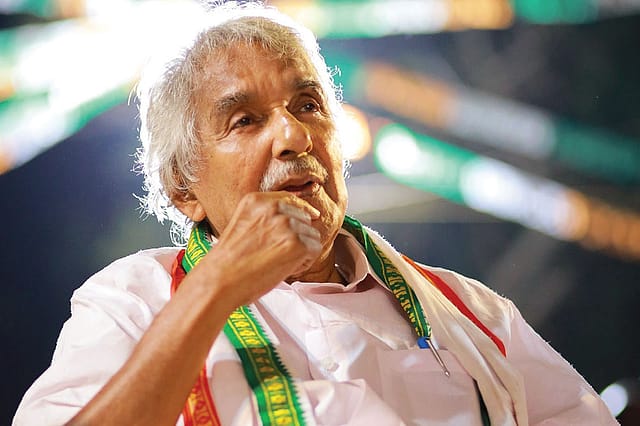Oommen Chandy (1943-2023): A Reasonable Politician

FORMER KERALA CHIEF Minister and Congress veteran Oommen Chandy, who passed away on July 18, had a larger-than-life public image though he was not flamboyant or aggressive. Nor was he a great orator or a mass leader of the stature of some of his illustrious predecessors in state Congress. Yet, in death, he acquired a halo thanks to a growing public perception that politics is falling increasingly short of the likes of Chandy—those who are decent, accessible and generous. Chandy, 79, had been unwell for a while and had been out of the public glare.
For a Congress leader who cut his political teeth in the turbulent student politics of 1960s Kerala, he had been careful not to attract controversies, and until the last phase of his chief ministerial stint in early 2016, he did not get embroiled in any such rows. Then came along the "solar scam" involving a woman who allegedly offered sexual favours in exchange for certain business gains, and Chandy became the whipping boy of the media overnight, in the run-up to the Assembly elections of 2016 that brought the rival Left Democratic Front (LDF) to power.
Born in 1943, Chandy earned a name for himself in state politics at a young age. As early as 1970, aged 26, he contested and won the Assembly election from what was earlier a rival seat, Puthuppally, in Kottayam district. From then, for 53 straight years, he continued to represent that seat in the state Assembly without a break. That is 12 elections in a row.
Throughout his political career, he had been accessible to people from all walks of life, irrespective of their political affiliations. Always to be spotted among a crowd of people, in his office, at home, and wherever he travelled, Chandy couldn't be seen as separate from the people. As chief minister, his outreach programme to listen to people's grievances was successful primarily because he knew people management and how to mix with large groups of strangers and still strike a chord with them. That was one of the biggest pluses of Chandy the politician: who was there to hear you one-on-one.
Imran Khan: Pakistan’s Prisoner
27 Feb 2026 - Vol 04 | Issue 60
The descent and despair of Imran Khan
Although a section of the media and rivals have now 'discovered' specific other characteristics of the late leader—such as him being a political strategist and unifier of sorts, and so on—it was none of those attributes that endeared him to anyone who met him when was in the thick of Kerala politics. Most famously, he was an able manager with the smarts to keep the herd together amid seemingly irreconcilable differences over social representation. That he could not be provoked to react at whim was what separated him from many of his colleagues.
For instance, when a senior rival politician made nasty remarks about his family in the state Assembly while he was chief minister, he didn't react or display the anger that comes naturally to people on such occasions. Again, when he was attacked on the streets of Kannur district by political rivals, he chose to say that he had no complaints, perhaps much to the anguish of several of his colleagues who wanted to make an issue out of an unwarranted assault that left him injured.
As a towering leader of Congress in Kerala, Chandy was often asked to take up national roles. But he chose to say no to such suggestions by the central leadership. On one occasion, when this writer interviewed Chandy, he categorically stated that he had no interest whatsoever to be in national politics and that he preferred being in Kerala. This also proves that he was happy on his home turf and was not carved in the mould of several of his peers who often chose to punch far above their weight in the name of acquiring more power.
Chandy, chief minister from 2004 to 2006 and 2011 to 2016, will be remembered as a remarkable politician who knew how to handle power democratically. He was a reasonable man and did not at any moment in his long career in politics suffer from an empathy deficit, a rare feat.
